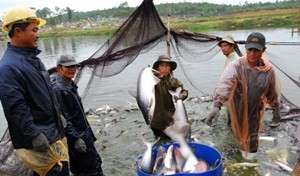(VOV) – Until recently, tra fish aquaculture in the Mekong River Delta has provided profits and generated jobs for millions of local people. Vietnam’s tra products have been favored by customers around the world contributing to the country’s export turnover of up to 1.8 billion USD in 2011. Despite these advantages, the industry is facing many difficulties for sustainable growth. The Ministry of Agriculture and Rural Development established this month the Vietnam Pangasius Association.
 |
| The establishment of Vietnam Pangasius Association will help farmers in rearranging production, closely linking it with the market, programming, aqua-culture and processing. |
2012 was said to be a difficult year for Vietnam’s tra fish production. Statistics released by the Ministry of Agriculture and Rural Development show that there were about 160 catfish exporters in the country, a decline of 30% against in 2011. Only 20% of the exporters could maintain a stable export while the remaining operated perfunctorily. Therefore, the establishment of the Vietnam Pangasius Association is of great significance for the industry’s growth. It is hoped that the association will help the industry develop sustainability, especially in terms of a balance in supply and demand, production costs, and healthy competitiveness. The association will also provide technical assistance for tra raising, according to Nguyen Ngoc Hai, head of a cooperative to raise tra fish in O Mon district in Can Tho City. Hai explains further ‘Over the past years, I’ve faced numerous difficulties in raising tra fish. I feel glad to know that a pangaisus association will be set up and hope that it will help farmers like me sell the products profitably and avoid over stock.’
Vietnamese tra fish has been available in many countries but challenges continue to be anticipated for the industry due to competitiveness being undermined by management shortcomings and stringent quality and hygiene requirements set by importers. Anti-dumping lawsuits and other trade barriers weakened the industry as well. Tran Van Hung, President of Hung Ca Company in Dong Thap, proposes ‘The establishment of this association has been a wish of many companies in the indsutry. I hope that the association’s leaders will be experienced people who have many opportunities to work with foreign partners around the world so that they know how to promote Vietnamese tra fish widely.’
In the plan to develop the production and consumption of tra fish in the Mekong River Delta by 2020, catfish is considered one of Vietnam’s major export items. As a result, the launching of such an association is necessary for the socio-economic development of provinces there, providing jobs for the local and improving the image of Vietnamese tra fish in the world. Vuong Binh Thach, Chairman of An Giang People’s Committee, highlights the need to outline regulations on tra fish as a provisionary trading product and issue a policy on 0% tax support from six months to a year. Thach adds ‘The focus of the association should be in rearranging production, closely linking it with the market, programming, aquaculture and processing. I hope the Ministry of Agriculture and Rural Development, the Association, and eight provinces in the region will work closely with each other and share the same view to jointly develop the country’s tra fish industry.’
Recently, Sweden and Denmark have added tra fish to their green lists that recognize Vietnamese products to have been raised in accordance with international standards. In the middle of last August, US Department of Commerce lifted its anti-dumping tariff imposed on Vietnamese tra fish.
Thanh Tung